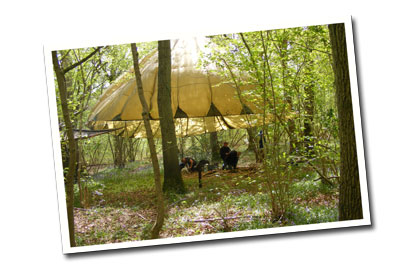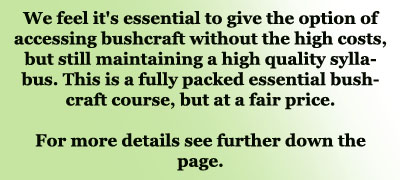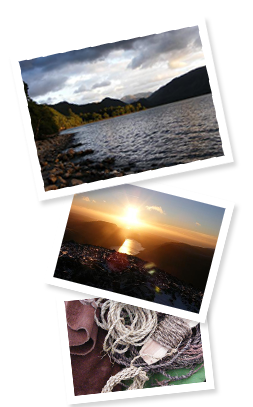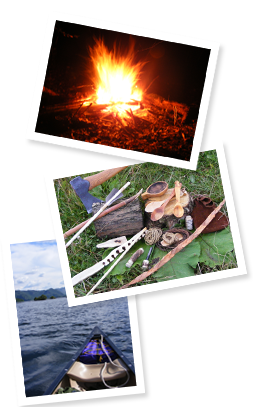
Any issues/queries regarding booking please email learnbushcraft@gmail.com
We will ask you for the remaining balance 4 weeks prior to the start date. If booking with less than 4 weeks to the start date we will contact you as soon as your deposit is received.

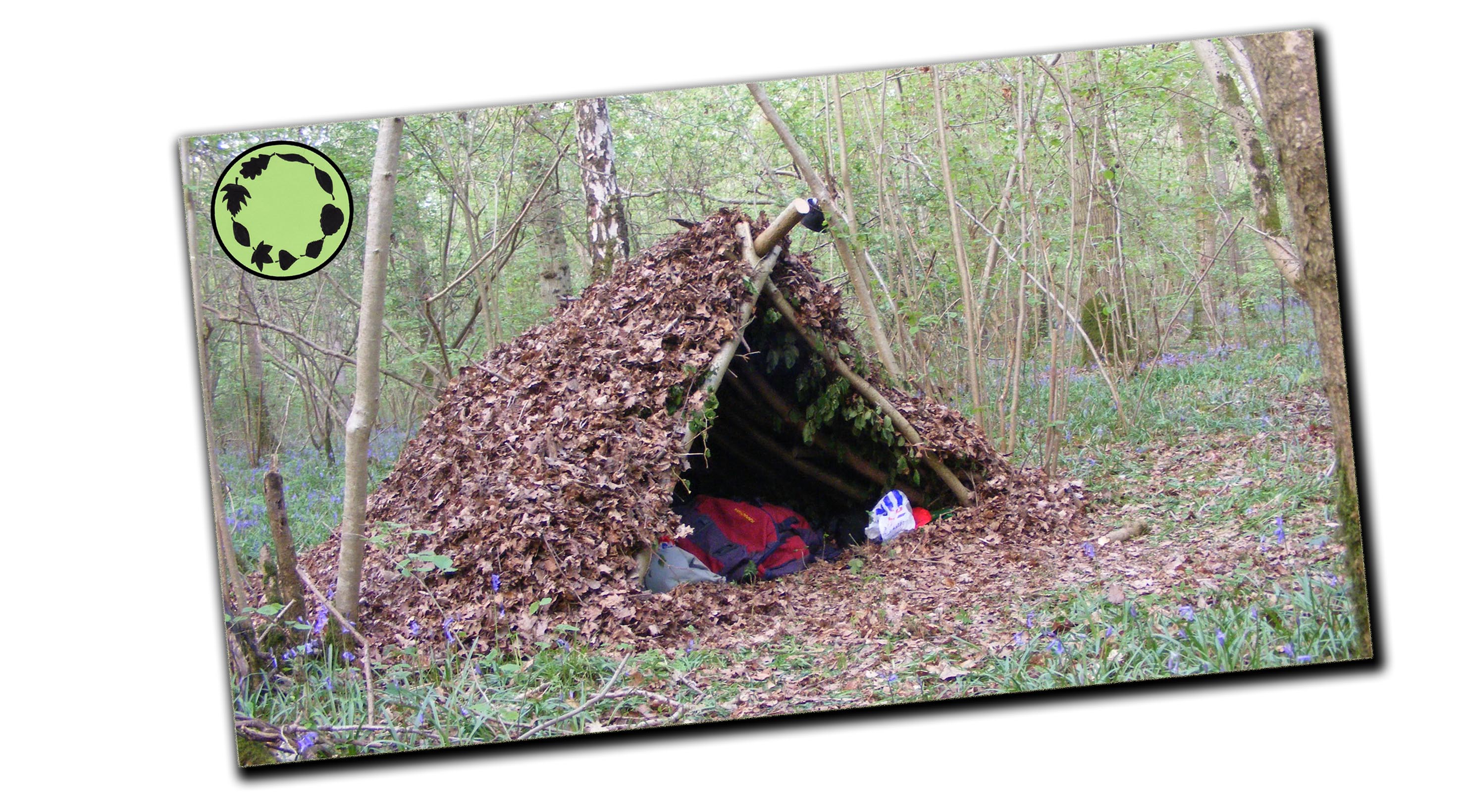 We feel it's essential to give the option of accessing bushcraft without the high costs, but still maintaining a high quality syllabus. This is a fully packed essential bushcraft course, but at a fair price.
We feel it's essential to give the option of accessing bushcraft without the high costs, but still maintaining a high quality syllabus. This is a fully packed essential bushcraft course, but at a fair price.
To run this course at a lower price we drop it from 5 to 4 days and leave a few things out, for example, we teach one method of fire by friction instead of two. We also do away with the test day. In any case, who wants to pay to be tested? You want to pay to learn! But we feel this will still equip you with a great wealth of essential bushcraft and survival skills and will rival most other bushcraft courses in the UK in terms of teaching content and skills. The skills we omit from here can be easily practiced on your own using the skills base you developed with us or you could even join one of our follow up fire by friction courses.
See the bullet points below for more information on the content of this course.

We also ask that you self cater, bring your own food and you provide your own pot, knife and saw, all three of which can be purchased collectively for as little as £30. You learn how to use them whilst you're with us and then take them away with you at the end. We will also provide links to enable you to easily buy the correct items. We still provide all the other bushcraft equipment such as tarps and fire lighting materials, you just have to bring yourself, a sleeping bag/bivi bag and sensible outdoor clothing. We do provide a kit list of reccomended items to help people ensure they bring everything to make themselves comfortable so they get the most from this very rewarding experience.
The course is run from a expedition style base camp in gorgeous woodlands. You will learn an array of skills to carry in your mind and muscles whilst being surrounded by birdsong, the scent of wild flowers, sightings of deer and badger.
The course runs from 10am on the first day and finishes at about 4pm on the last day.
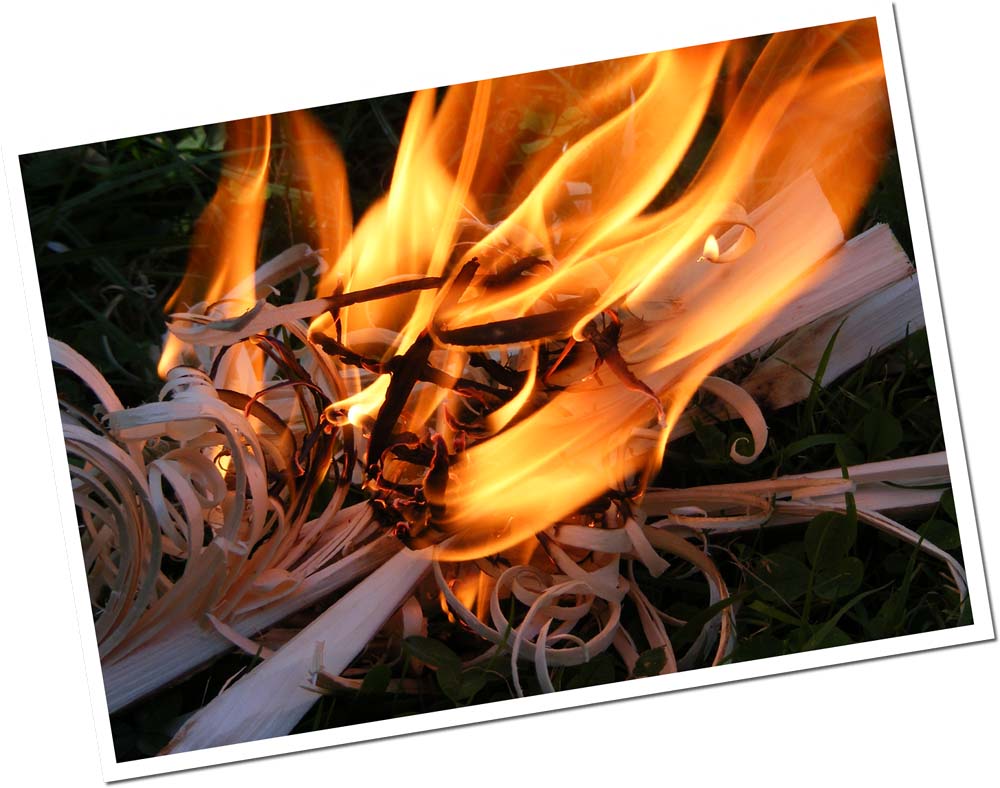
Max group size: 10
Duration: 4 days
Cost: £210
pre-requisite bushcraft courses: none
Day by Day Breakdown:
Day 1
Everyone arrives in the morning and are given a quick welcome talk, then it's off to the woods to begin your bushcraft experience! After a short walk across a field we arrive at our gorgeous woodland base camp in the seclusion of the Oak & Hazel trees. This will be our base for the duration of your bushcraft training. In spring this area is blanketed in bluebells. We then sit down, introduce ourselves and get to know each other. There is a bushcraft H&S briefing, a tour of camp and a look at the local area around our base camp. We then talk briefly about the line between bushcraft and survival before looking at the rule of 3’s and the priorities of survival. Then we're on to the first task in bushcraft; learning to use our knives and saws. After talking to you about how to choose the correct tools for bushcraft, we take you through the essential carving techniques and then demonstrate the first project; carving tent pegs. Then it's your turn to make 4 tent pegs which we use for the next task; setting up safe camp. We talk you through the importance of shelter and the site of your bushcraft camp. We then loan you some brilliant 3m x 3m DD tarps, which are regarded by many as the best for bushcraft. We show you how to set them up, teaching the first 3 essential and useful knots. After this we move on to carving an adjustable cooking pot hangar, known as a wagon stick. As always we demonstrate then it's over to you whilst we remain on hand for any help! Next it's all about lighting your first fire, we use ferrocium fire-steels for this first camp fire. We will take you through all the preparation, techniques and teach the skills required to get that first flame. The again it's over to you to make your own camp fire! Once your fires are established we bring you in for a talk on efficiency, conservation of firewood, fire management and show the different types of fire lays and their uses. Next we ensure everyone sets up their camps correctly to ensure as much comfort as possible. Then it’s onto tinder bundles in preparation for the following day of fire by friction training. We demonstrate how to use a small coal to ignite a tinder bundle, taking you through all the stages. The again it's over to you to try this skill for yourself. Next, we talk to you about re-lighting fires, something essential for the following morning. Finally once the sun goes down, if it's clear enough we look at some natural navigation using the stars.. if it's not clear we save this for another evening. At last we relax around our fires, either your own (if you prefer solitude) or the base camp where we all chat (instructors included) and reflect until it's off to bed. Throughout this day and all of the days of the course if there are any wild edibles nearby we will show them to you as a way of introducing safe foraging. We then re-enforce this with a detailed wild edibles walk at the end of the course.
Day 2
First order of the day is shelter building. We look in detail at the effects the natural world can have on the body without shelter, looking at how this can lead to hypothermia and hyperthermia. We then look at an essential bushcraft survival shelter, the debris hut. We show you how to construct it, even without using tools. We talk you through making a comfortable sleeping area, how to insulate it and waterproof it effectively. Then it's over to you to build your own home out of the materials around you. There is no requirement for people to stay in their shelters overnight, although we find most do, in any case you keep the tarps for the duration of the course. To speed up construction, we often have a stockpile of branches lying around. After lunch it’s a quick look at axes then on to the bow drill, the essential bushcraft method of lighting fire. We take you through a full demonstration, starting at the very basics of finding the correct materials, the tests we use for this and the likely places you'll find the best woods. We talk about the different types of bow drill cord, both natural and man-made and teach you some more knots. Then we show you how to carve a kit, pointing out the subtle tricks to ensure you kits runs smoothly & teaching some more advanced bushcraft knife skills. We also talk about the science behind friction fires before finally moving on to a working demonstration of this essential bushcraft skill. Once we've created the coal, we then use the same tinder bundle preparation skills shown the night before to turn that coal into a camp fire! Then it's over to you once again! Our bushcraft instructors will watch and help you along the way, we also bring lots of suitable materials with us enabling you to carve your own kits easily. Once successful we then send you off into the woods to locate your own fire by friction materials to make your fires from scratch!
Day 3
This first thing we look at is cordage! We examine the seasonal sources and depending on the time of year we use the most appropriate materials and then set this as a project for you to complete, with our help of course. With all the bushcraft tasks, we demonstrate first then let you acquire the skill. After this we normally have a little time to trouble shoot any bow drill issues and make any shelter improvements you might need. We find this approach is very effective with the bow drill as it gives everyone’s muscles the chance to recover overnight. Often those who didn't manage to make fire the previous day normally succeed on the morning of day 3. Next we look at the carving of feathersticks; an essential bushcraft survival skill and we also set you a fun little challenge! Then it's onto looking at natural glues, the sources and types. A look at water sources, purification and the dangers posed from both chemical and biological contamination. Next it's a look at wilderness fishing, the laws surrounding this and a very effective wilderness fishing technique, involving the procurement of hooks from nature. We also look briefly at harpooning. Then for the evening we normally go through game preparation, depending on what the local game keeper provides. This is totally optional and there is no requirement for everyone to take part in the game prep session. We also look at cooking in a pit oven, with hot rocks and demonstrate this by cooking a nice joint of beef for all to share.
Day 4
On the final day we use the cord you made to look at trapping. We talk about the ethics and laws of trapping and then talk about the location, the setting and the types of trap that prove most effective. We teach the essential and very subtle skills you need to make your traps work and the skills needed to locate & set them with minimum impact, thus heightening chances of success if you ever find yourself in a survival situation. However, we always insist that traps are to be used only in a survival situation. And as UK law and ethics dictate, no animals will be trapped on this course. However, as part of trap setting we also look at tracking and may have already introduced you to this during our time in the woods! With bushcraft you always have to seize any opportunity nature throws at you! Then it's off on a more in depth wild edibles walk, looking at an array of what nature can provide at any particular time of year. There will be a chance to sample whatever is available, depending on the season, and of course this lets you re-enforce any wild edibles you've been introduced to during the previous 3 days. During this walk we will also look at other ways of navigating yourself naturally through the wilderness and procedures to use if you become lost. We also look at basic map and compass work.
Finally it's back to the camp where you’re shown how to clear away leaving no trace and leave an absolute minimum of impact on the woodland environment.
There is a final debrief and the chance for you to feedback to us, although we welcome this at any time during the course!
Enquiries: contact us on learnbushcraft@gmail.com
Bushcraft Course Date 2017
18th - 21st August (Available)
